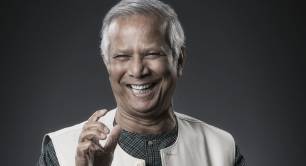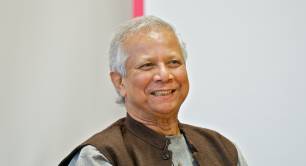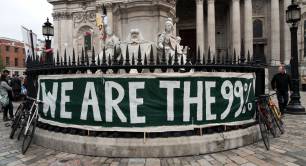Muhammad Yunus: the ‘superhuman’ generation and social businesses can save us from extinction
The Nobel laureate sees a bleak future ahead, unless we act fast to reset our failed economic system. Enter the young people endowed with superpowers – and the social businesses designed to solve problems.
The current economic “machine” has enabled harmful wealth concentration, according to Professor Muhammad Yunus – leading the majority of the world's population to live close to the poverty line.
Capitalism, which is driving that machine, had turned people “into profit-maximising robots”, he continued, but young people could bring back some humanity and hope.
The Nobel laureate was speaking earlier this month at the closing session of the Social Enterprise Futures conference, where he was introduced by Social Enterprise UK’s CEO Peter Holbrook as “one of the founding fathers of the modern social enterprise movement”.
- Read more of our coverage from Social Enterprise Futures
In a wide-ranging discussion Yunus, who turned 81 this year, described how the “economic system that we practise doesn’t have any human consideration”. This was seen clearly during the Covid-19 pandemic, he said, where many businesses were more focused on profit than anything else. Meanwhile, citizens had “lost faith” in their political leaders.
Our house is burning. It’s on fire. But inside the house we’re having parties
“We believed before the pandemic that we are a global village,” he said. Instead of seeing a community effort to tackle it, “we saw isolated islands... all busy protecting themselves”.
Politicians seemed unfazed too by the climate crisis, which was creating two worlds – one “liveable” and one “unliveable”. Meanwhile, the pledges of large corporates on climate action were mostly “public relations gimmicks to make them look good”, Yunus said.
“Our house is burning. It’s on fire. But inside the house we’re having parties. We don't even recognise that we're on fire... The fire will not disappear, it’ll get worse”.
But amid his bleak outlook, the pioneer of microfinance shared some more upbeat messages, as well as inviting listeners to join his 'three zero' initiative, which aims to help achieve zero net carbon emissions, zero wealth concentration and zero unemployment.
Read on for four reasons to be hopeful.
Everyone is an entrepreneur
Unemployment is a concept, not a fixed state, according to Yunus. That means we can change it.
“Human beings are not job seekers, they are not created as job seekers. They are born as entrepreneurs,” he said. Instead of being given the opportunity to develop an enterprise that could solve problems, they were expected to find a job and if they could not, were displaced economically, categorised as unemployed and ultimately fell into poverty. This unemployment-to-poverty pipeline only served to diminish the true potential of people, according to Yunus. By rethinking everyone’s potential we could create a shift that would trigger economic change.
Human beings are not created as job seekers. They are born as entrepreneurs
- Read: Only one in five young social entrepreneurs in Europe can live off their ventures, new report shows
Helping others – not profit – creates “super-happiness”
Humans had been reduced to “profit-maximising robots” by the current economic system, and this had caused us to think that pursuing money and profit was the real incentive. However, the professor also challenged this by saying, “making money may be happiness, but making other people happy is a ‘super-happiness’. So you try the super-happiness part”.
Society found it hard, at times, to go after “super-happiness”, Yunus explained, because we “don’t think protecting people is an incentive and that is where the human element is missing in the whole picture”. Instead, many people thought making money was the incentive. Until we can break away from this line of thinking and make “super-happiness” our goal, only then would society start to transition to a different system.
Social business can create a “new civilisation”
Asked by Holbrook if social business could provide a sustainable economy for people and the planet, Yunus was clear.
“Social business is defined as a business to solve problems,” he said.
The link between entrepreneurship and the pursuit of “super-happiness”, therefore, was social business. Social entrepreneurship had shown that it was possible to move away from profit maximisation and still allow businesses to flourish. As social businesses were “driven by the collective interest”, they served the pursuit of super-happiness while tackling the world’s most pressing social and environmental issues. As a result, professor Yunus expressed high hopes for social enterprises: they could be the “creators of a new civilisation”. However difficult it may be, social entrepreneurs should continue to “take [that task] seriously, make it happen and history will remember you”.
Making other people happy is a ‘super-happiness’. So you try the super-happiness part
Young people are “superhuman”
Younger generations, who Yunus invited to form 3ZERO clubs, would play a key role in moving the world away from what he described as today’s “suicidal path”.
“They cannot follow the same old system that we have been following under the current economic system,” he said. Not only that, they were also “the most powerful generation in human history” because “they command the technology”. He then gave a message of hope: “Truly they are superhuman – so feel like a superhuman”.
Elaborating on this, Yunus said that while previous generations who would write a letter by hand, put it in a mailbox, and wait for weeks to get a reply, today’s youth could “instantaneously communicate all over the world”. Such powers gave today’s young people “superhuman” powers, he said.
Thanks for reading our stories. As an entrepreneur or investor yourself, you'll know that producing quality work doesn't come free. We rely on our subscribers to sustain our journalism – so if you think it's worth having an independent, specialist media platform that covers social enterprise stories, please consider subscribing. You'll also be buying social: Pioneers Post is a social enterprise itself, reinvesting all our profits into helping you do good business, better.



